Life as a Leave No Trace Trainer: Donielle Stevens
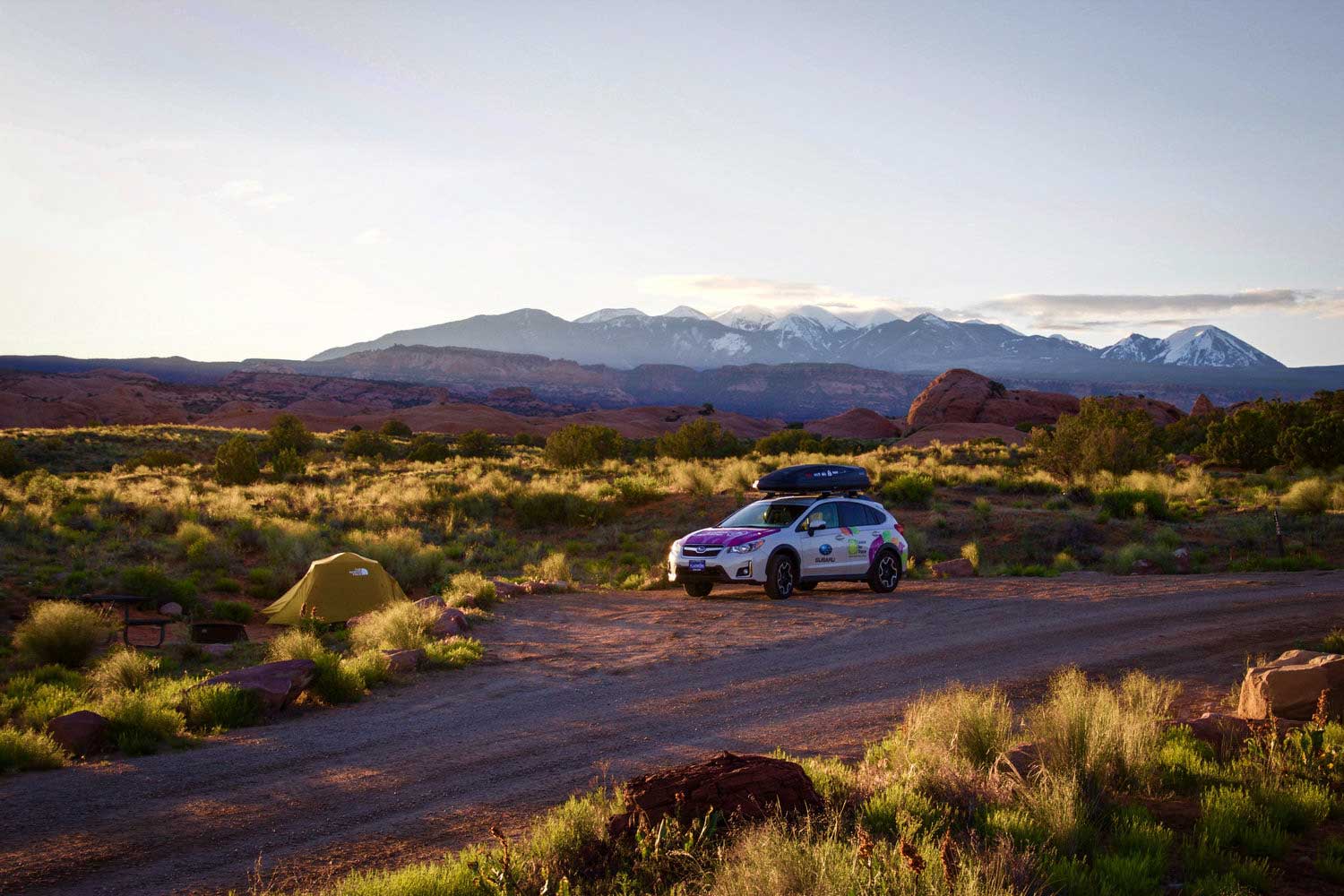
Life as a Leave No Trace Trainer
Donielle Stevens
Donielle and her boyfriend Aaron are traveling the United States working as Subaru/Leave No Trace Trainers. They’re traveling National Parks, festivals, workshops, and everywhere in between, camping 250+ nights of the year and living (and working) out of a Subaru Crosstrek, on a mission to teach people how to enjoy the outdoors responsibly.
Learn from Donielle how she went from 9-5 to a career on the road, and how she’s balancing work with adventure. Interview below!
All photos courtesy of Donielle Stevens unless otherwise indicated.
Meet Donielle
How did your lifestyle come to be? What was life like before you left?

Photo by Stephanie Whatton
I had just graduated from university and was dealing with deciding what to do after 18 years in school. I was working in marketing which didn’t really fit me. Although I love working with the public and talking to people, sitting at a desk 9-5 felt punishing. I’d come home with no energy, would make dinner, watch TV, go to bed, and do it all over again the next day. Sometimes the only time I was outside was walking to my car and into the office or house. I’d explore on the weekends, but it never felt like enough.
I saw this trajectory of life filled with boredom and occasional weekend fun. I felt too young to start on that path so seamlessly. I wanted adventure. I was hungry for a different way to live. I needed to have a job that was more hands-on and not just behind-the-scenes. I started looking for ways to change careers, travel, and challenge myself. This job lets me do all of that!
What lead you to Subaru and “Leave No Trace” training? What’s a typical day on the job like?
Aaron and I applied to become Subaru/Leave No Trace Traveling Trainers this past January. We work for
Leave No Trace – a national organization that protects the outdoors by teaching people how to enjoy it responsibly. We’re the non-profit leading the movement for practicing minimum impact recreation; washing your dishes away from water to protect stream and lake environments, burying your poop to maximize decomposition, sticking to trails to protect vegetation, not feeding wildlife, packing out what you pack in, that kind of thing.
I have such a passion for the organization – it’s a dream job for us! Subaru is a main sponsor of the Traveling Trainers, supporting our mission and programs, so that’s why their name is in our job title. After going through an intense application process, we were chosen for the job and completed three weeks of training in Boulder, CO.
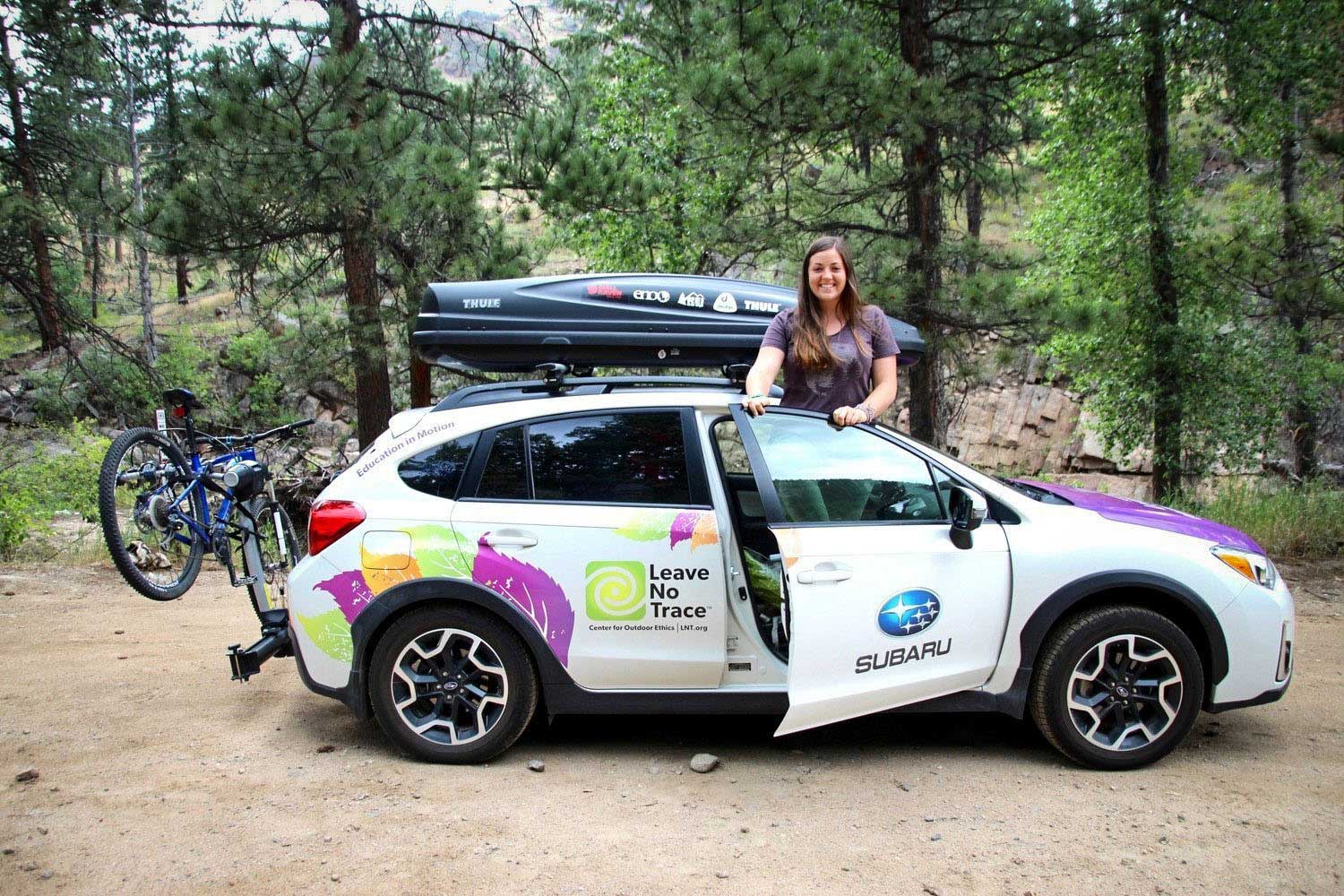
Every day is wildly different. We have events all over the country teaching people how to Leave No Trace when they’re outside enjoying their favorite activities. We go to music festivals, elementary schools and universities, we work with state and national parks, the Forest Service, Boy Scouts and Girl Scouts, and community partners like retailers and outdoor clubs. We try to be everywhere that people are going outside – which is a lot of places!
Most days I wake up in the tent, cozied in my hat and sleeping bag, to the sound of pots and pans. I hear water boiling for coffee. Aaron wakes me up softly because he knows I hate mornings. He is a life saver.
We eat, pack up camp, and hit the road to our next location. Depending on the drive time, what events we have, or if we need to have an office day, we’ll try to plan some exploring in whatever place we end up. A bike ride, a stroll around town, a hike we heard about, hot springs that were recommended. Then we do it all again. We’re usually in one place from a couple days to a week before we move to the next spot!
How long have you been on the road? What’s the most beautiful sight you’ve seen so far?
We’ve only been on the road for three months. We’ve mostly been traveling all around Colorado this summer with a few trips to Utah, Wyoming, Nevada, and California. We’ve camped 52 nights so far, though our job will have us on the road until next April, so we’ll have a lot more nights under the starry skies! Most teams end up camping 250+ nights a year.
A favorite sight was in Grand Teton National Park. We were working with staff on educating visitors about Leave No Trace and had the morning to explore. We took out some kayaks and were paddling on the silent, flat water of the lake with the enormous mountains towering over us. We were contemplating how small we felt when we saw two huge female bald eagles perched in a tree above us. We watched them for a long time and then a male, with his iconic ivory-dipped head, joined the two females. It felt magical to be a part of a world so big, a quiet dot in the lake looking into the lives of a different species, our insignificance overwhelmingly serene.
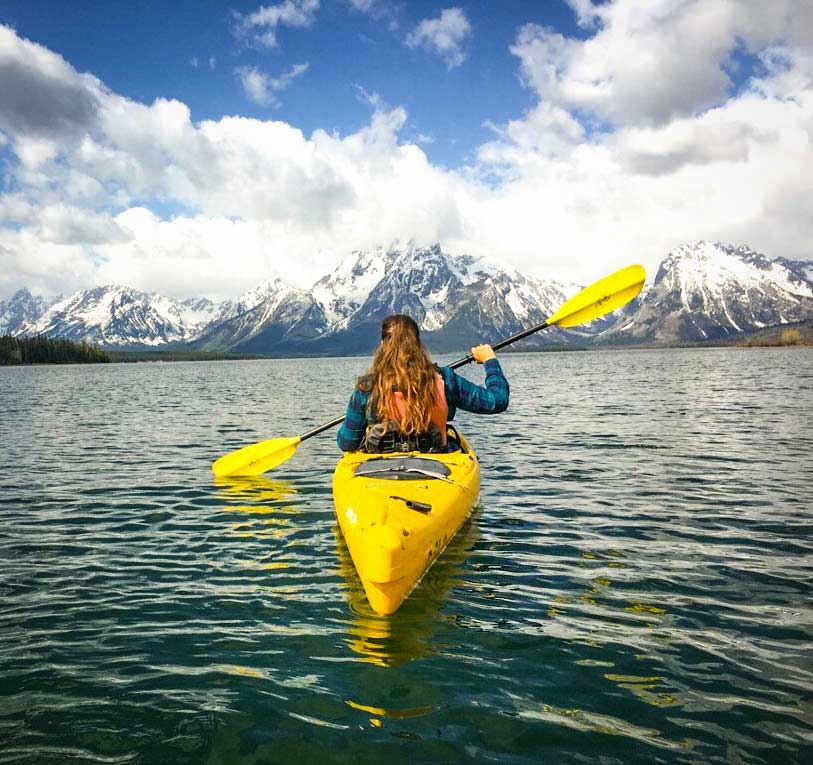
What is it like to live out of a Subaru Crosstrek? Do you ever feel pressed for space? What’s your solar challenge all about?
I love our Subaru Crosstrek. Her name is Marley and we’ve already hit 8,000 miles! We put the back seats down and built shelving in the back. We can’t sleep in it because of space so we tent camp, stay with friends, or find Airbnbs on the road.
We have a lot of work stuff with us which takes up room, but we’ve found a way to manage even with it all. We actually have a bit of space left over! At first I thought I’d be more stressed out not having the clothes or items I wanted or am used to having, but I’m so much more stressed when I have too much. Everything has a place in the car – if the item doesn’t fit it’s because it doesn’t go in that spot. We call the car a living organism because it’s always changing and morphing: we’re always adding and getting rid of things.

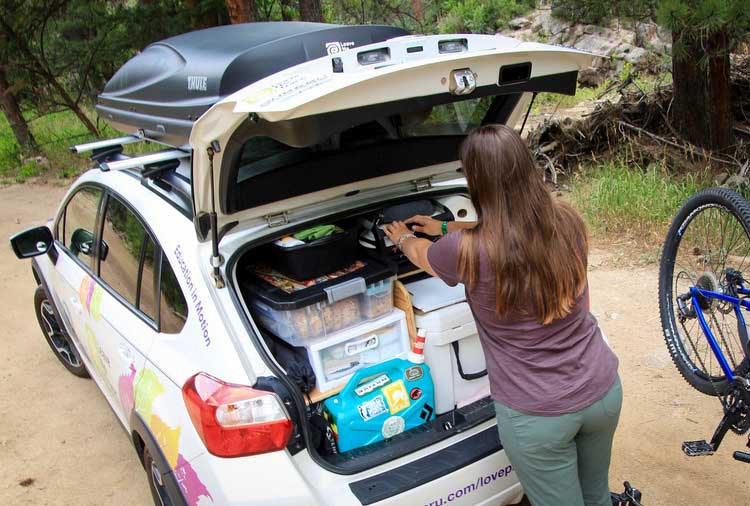
Aaron and I started a solar challenge to help us charge our electronics without using electricity from the grid. We have 3 phones, 2 laptops, an iPad, and a camera that we charge with two Goal Zero Sherpa 100 Kits. We haven’t plugged into an outlet for 63 days. It takes a little pre-planning, but it’s become a habit and a hobby.
You travel with your boyfriend. Does he work with Leave No Trace too? How do you share responsibilities of life on the road?
We applied for the job together, as they hire teams of two. Sharing responsibilities can be complicated but it’s getting easier. The biggest thing is being self-aware and communicating your needs and wants with someone. We trade off most responsibilities and try to be partners instead of one person getting burnt out doing one thing every day or all the time. Often times we’ll just say, “Hey, I’ll get dinner going if you want to set up the tent,” or, “I feel motivated to make this video right now – do you want to take a short hike while I work on this?”
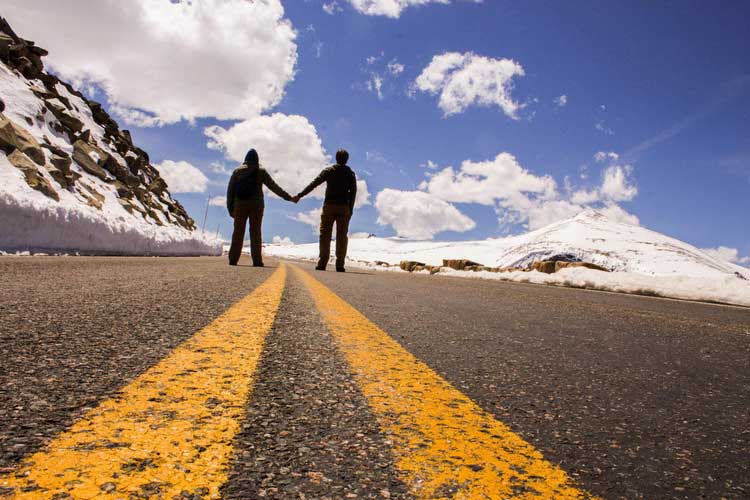 But we’re not just living and traveling together, we share a job. Which is hard. The greatest challenge has been giving up control. Most people have complete control over how they work, what styles they like, how they use their calendar, when they respond to emails, etc. I have to trust Aaron with my career in a lot of ways that you’d never have to with a significant other. Knowing when to let go of control and when you need to ask for more is a big lesson. We’re going to be so strong after this.
But we’re not just living and traveling together, we share a job. Which is hard. The greatest challenge has been giving up control. Most people have complete control over how they work, what styles they like, how they use their calendar, when they respond to emails, etc. I have to trust Aaron with my career in a lot of ways that you’d never have to with a significant other. Knowing when to let go of control and when you need to ask for more is a big lesson. We’re going to be so strong after this.
Take a photo of your 5 must-have items for your year on the road, and explain why you can’t live without those essentials.
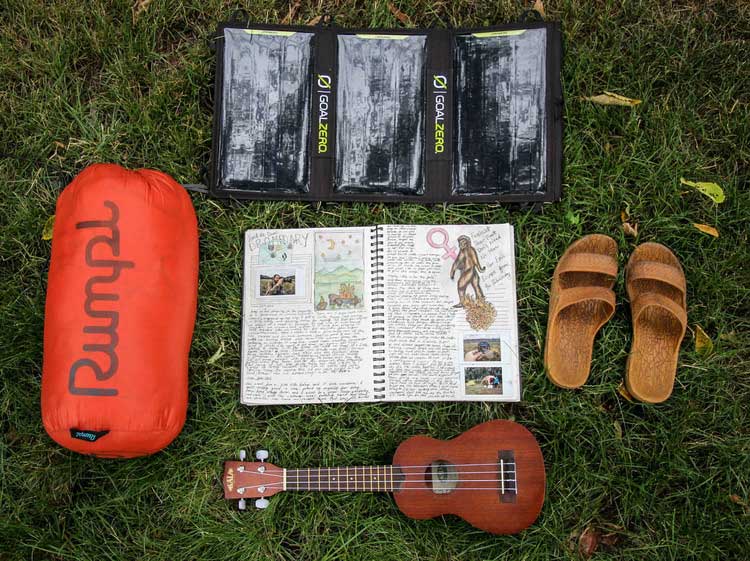
Donielle’s 5 must-have items
- I love my Rumpl Queen Size Down Blanket. My legs feel claustrophobic all glued together in a sleeping ag all night. I unzip my bag and lay my Rumpl over me so I can spread out and get comfy.
- My ukulele is a must. It’s small enough to take on hikes, and is a miracle for relaxing around the campfire.
- The Goal Zero Sherpa 100 Kit lets us charge all of our electronics without having to plug into an outlet. It’s important to stay charged when you’re working on the road!
- I had the idea to start an art journal before we left. I’ve had so much fun drawing and using watercolor pencils, writing, and including photos with my portable Instax SP-1 Printer. It’s really amazing to go back and read about things I would have forgotten. It helps me stay present and grateful. It also allows me to be creative while on the road.
- My Pali Slide Sandals are unbelievably comfy. They are only around $10 online and I take them everywhere. I wore them for a year traveling Thailand and they still hold up.
Describe where you’re sitting right now and what you can see from your tent.
I’m sitting in our tent right now. We’re camped at Twin Eagles, a campground in Lost Creek Wilderness in Colorado. I’m hiding out from mosquitos that followed me here after a dip in the river this afternoon. When I look out from the window I can see 30 or more mosquitos stuck to the tent screen, drooling at me, thirsty for a taste of the sweet nectar flowing beneath the surface of my skin. But beyond their tiny faces, alpenglow is hitting the tops of rocky peaks peering out behind tall lodgepole pines. The trees are filled with birds. I can’t see them, but I hear them. Loud squawks and calls interrupt the heavy sound of the river moving south. It’s one of the loudest places we’ve camped but noise from traffic and the electric world are silent here.
You mentioned that this is a year of overcoming fears, and that living on the road was one of them. Can you explain how you’re overcoming that fear, and what other fears you’re still battling?
I’ve always had anxiety about what I can accomplish. I’ve done a lot of traveling, with others and by myself, but I never seem to embody my success. Starting on the road and this job, I was worried I wouldn’t be a good educator, that I couldn’t talk to crowds of people, that Aaron and I would fight all the time, that I wouldn’t be able to handle the driving or would be burnt out from sleeping in a tent every night. I feel so good about being on the road accomplishing everything I thought I couldn’t. I feel crazy for doubting myself. Humans are so resilient – I’m so resilient.
I made it a goal this year to overcome fears, trying new things and challenging myself.
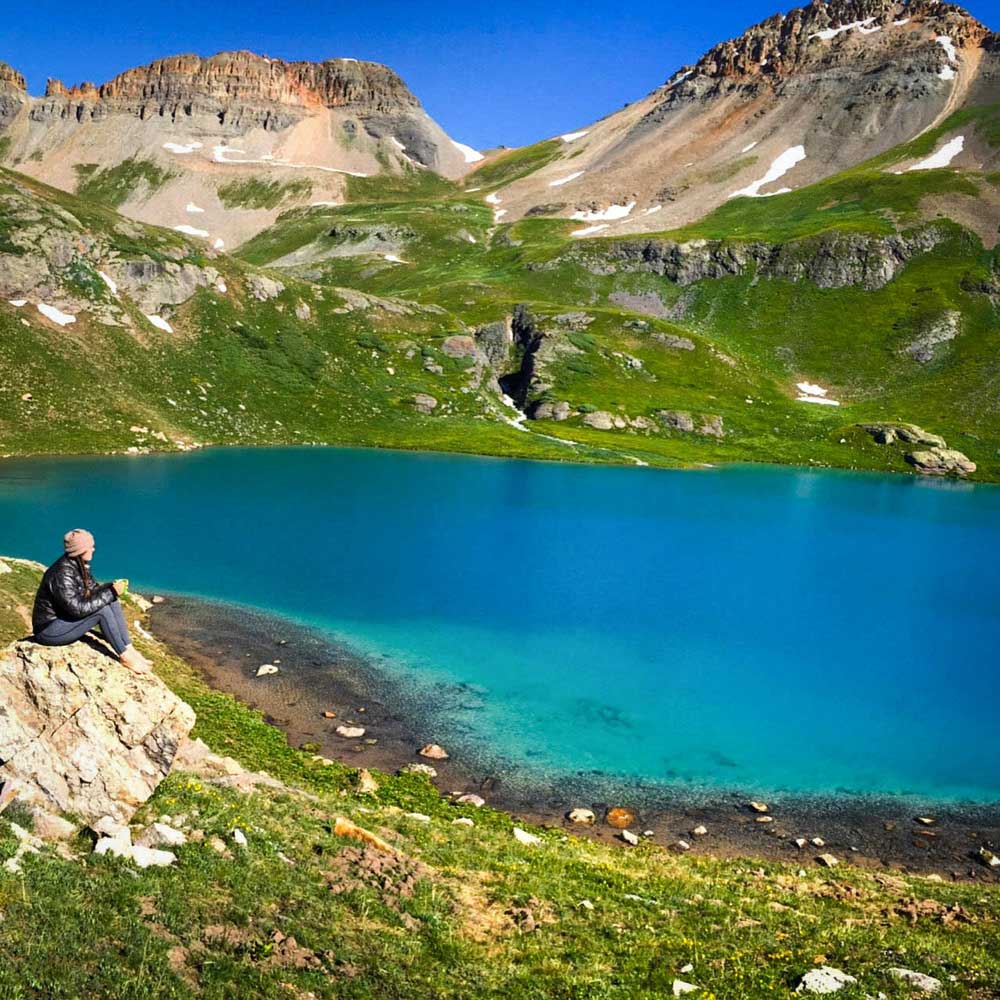 I’ve always told myself that I don’t like the activities others enjoy. For example, I tell myself that I don’t enjoy going downhill at high speeds – so I’ve never pursued mountain biking or skiing. Then I ditched my doubts and tried it, only to find myself smiling the whole way down.
I’ve always told myself that I don’t like the activities others enjoy. For example, I tell myself that I don’t enjoy going downhill at high speeds – so I’ve never pursued mountain biking or skiing. Then I ditched my doubts and tried it, only to find myself smiling the whole way down.
I’m learning to get rid of the story in my head of what I like and what I don’t and breathe through the unknown. It’s scary, but it’s supposed to be. That’s a different mindset for me.
I try to trust myself when I think I can’t climb a rock or finish a brutal hike. It feels so good after I shut my brain off and put one foot in front of the other.
You live on the road and work full time. What’s your advice for other women who want to take their careers on the road?
My advice is fight for your location-independence. I love my job and feel very lucky, but not everyone wants to ditch their career and work in another field just to be able to live on the road. We’re at a point in the digital age where lots and lots of careers could be location-independent, but they haven’t always been that way so they may not be listed or thought of as remote positions.
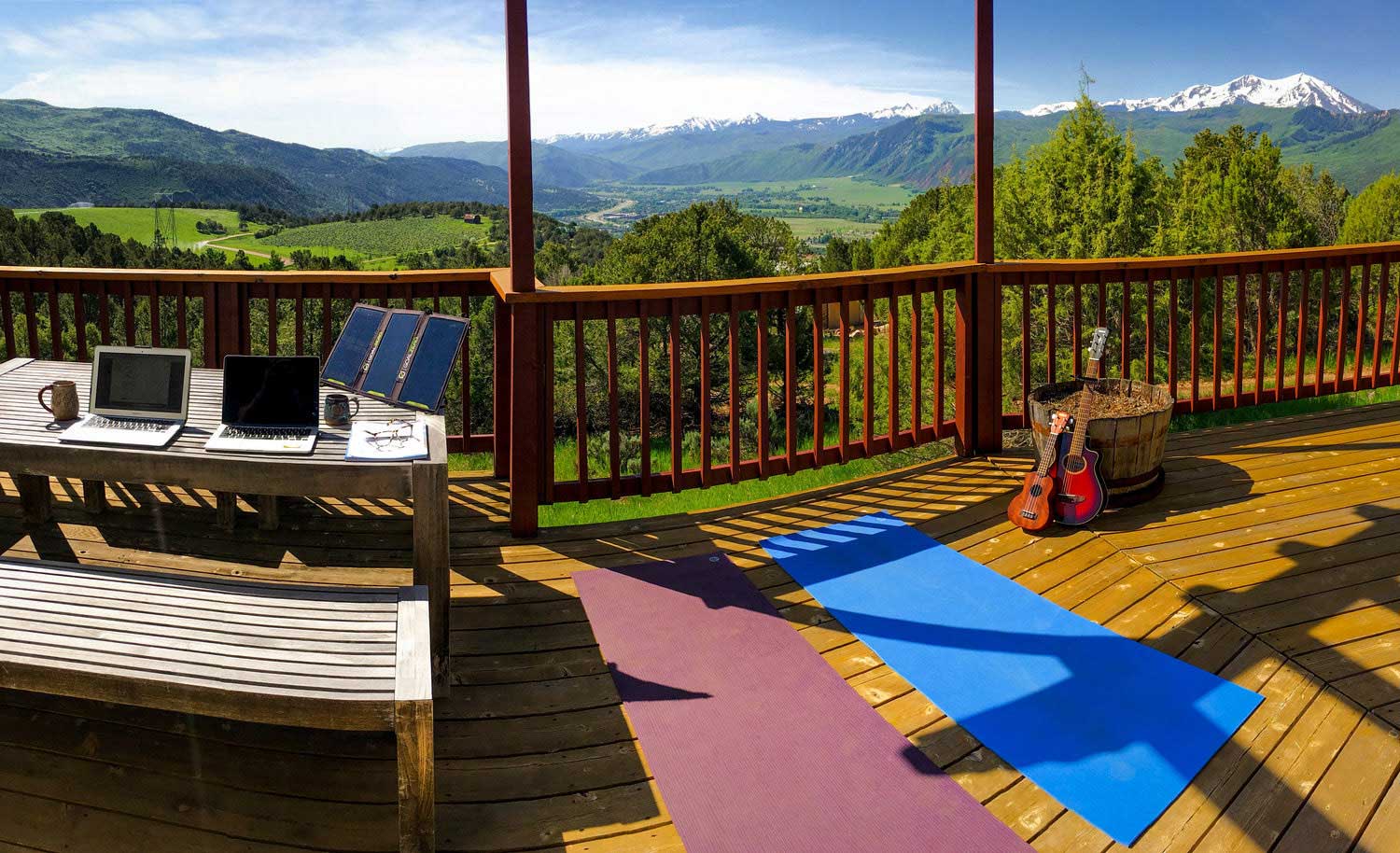
If you love your job and don’t want to quit, see if you can talk to a superior about starting a slow transition away from the office. Learn how to find flexibility in your schedule. Working 9-5 is different than being available 9-5. Can you work different hours and still be effective? Start with maybe taking one or two days a week that you work from home, find out what motivates you and how you stay focused. Then take a week and stay in a nearby city, somewhere with good wifi that isn’t too far away if it ends up not working out. Go to a coffee shop one day, a library the next, see how you work best. Look up how to shower at a rec center or a gym in the area.
Slowly transitioning yourself will help you fix any flaws in your plan, help you decide if life on the road is a challenge you’re ready for, and determine if your job and the road can play well together. Maybe you won’t spend the entire year remote, but just during slower periods, or for weeks at a time stopping into the office when you need to.
Know it will take more diligence, planning, and self-motivation on your part to miss meetings, be available for people and questions, and balance the two. It’s a struggle at first, but turning your career into a rewarding life of travel and adventure will be completely worth it.
If you’re not to this point in your career, give yourself time. Keep your eyes open for opportunities and build a lifestyle you love.
Is it hard to balance a work routine with constant travel? What things make you feel at “home’ or “work” as you shift place to place?
It’s hard to balance a work routine with constant travel, of course. But whenever I feel overwhelmed with planning or prepping I think about how unhappy and unbalanced I felt before this job.
Now we’re waking up early, we have to brave the elements whether it’s rain or bugs to get breakfast on the table, we have to set up our bedroom pretty much every night, we have to be on the road for hours, we have to think about where we need to be next week or next month and figure out how to get there, find internet, find laundry, find showers, find time for ourselves. It sounds like we should be stressed out of our minds, that we’d be miserable. But I’ve never been happier, I’ve never worried less or felt more alive. It’s hard to balance any home and work life, why not this version than any other?
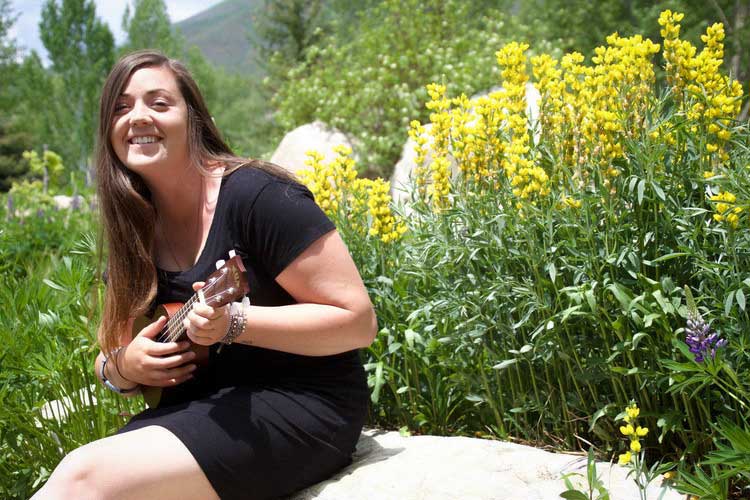
It sounds like we should be stressed out of our minds, that we’d be miserable.
But I’ve never been happier, I’ve never worried less or felt more alive.
There are lots of things that help us shift. One is we don’t use the computer unless we’re working. We don’t often scroll on Facebook or Reddit which allows us to associate the computer with work – if it’s open we’re motivated. We have a to-do list that when it gets too big or urgent we plan for a work day. The minute I open my journal, jump on the ukulele, or start hiking a new trail, the work world fades away. Aaron loves building small (responsible) fires at camp, playing guitar, or taking star photos, all of which calm him immediately.
We try to plan one office day a week where we’ll need a coffee shop, library, or space to get work done. Once you know what helps you get motivated or unwind for the day, it’s not too bad to shift from place to place.
Where are you now (July 25, 2016) and where will you be in one month? What about six months? A year?
Right now we’re on our way to Boulder, Colorado to meet with our boss and coworkers and get ready for an upcoming event. We’re hoping to have a sunset picnic at Lake Isabelle in Indian Peaks. Wilderness and ride our bikes around the city…
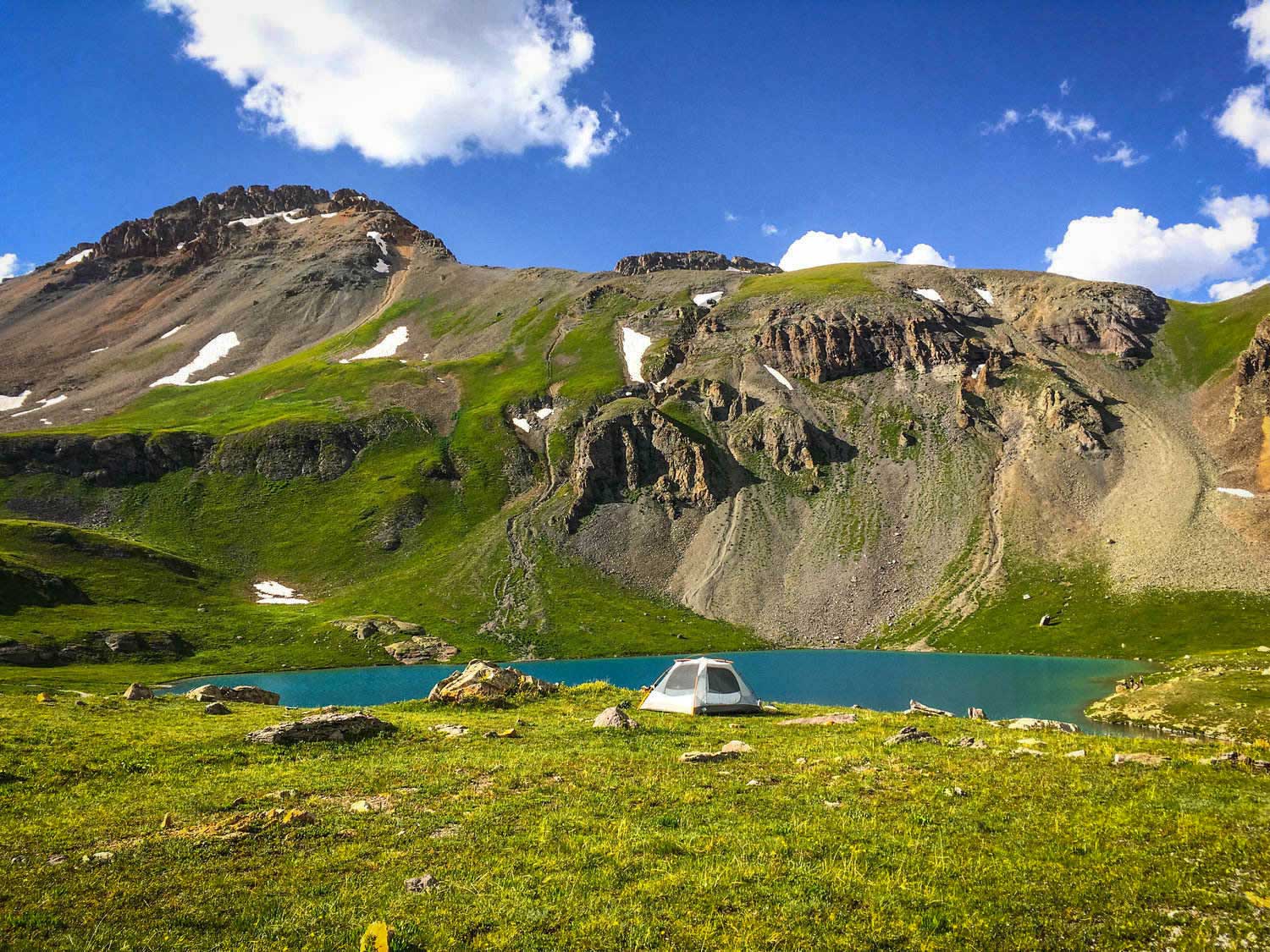 In one month I’ll be at a music festival in Lyons, Colorado educating festival goers about how to minimize their impacts while they camp or recreate outdoors.
In one month I’ll be at a music festival in Lyons, Colorado educating festival goers about how to minimize their impacts while they camp or recreate outdoors.
In six months, we’ll be somewhere in the central United States, hopefully down south for the winter.
A year is tougher. We’ll decide in November if we want to continue our work with Leave No Trace. If you ask us now we’d say, “OF COURSE!” but we’re thinking it’s better to make that decision down the road. If I’m still working with Leave No Trace, I hope I’ll be somewhere on a mountain top, our tent spread out by a clear blue lake we’re helping to protect.
If I’m not working for Leave No Trace, I’ll be looking for another way to sustain an adventure-based lifestyle. I’ve gotten a taste and I can’t stop now.
Follow along with Donielle on Instagram.
Editor’s Note: This interview includes Amazon Affiliate links, which provide a small commission for She Explores and help us keep sharing your stories. Learn more here.
Be the first to comment